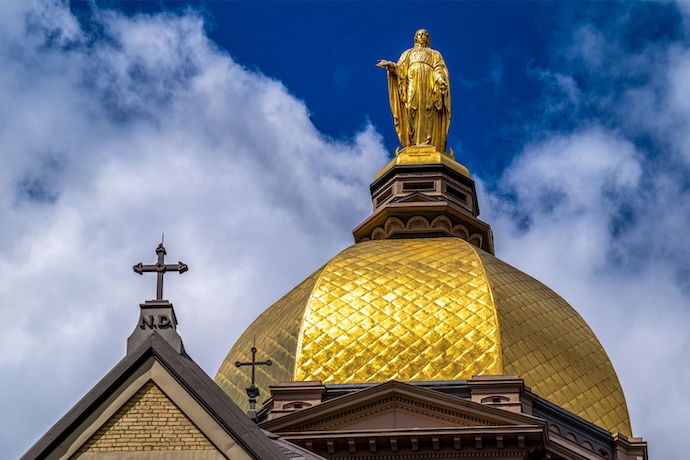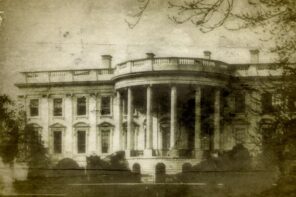In a recent essay for The Atlantic, David Wolpe, a rabbi and visiting scholar at Harvard Divinity School, sizes up former president and insurrectionist Donald Trump as follows: “the lavishness of his homes, the buildings emblazoned with his name and adorned with gold accoutrements, his insistent ego, even the degree of obeisance he evokes among his followers…” Wolpe concludes,“there’s something a little pagan about the man.”
If that last bit leaves you scratching your head, you’re not alone. The first image that pops into my mind in association with “gold accoutrements,” buildings named after wealthy individuals, and a high “degree of obeisance” among one’s followers is a very Catholic one—the Golden Dome, topped with a 19-foot, two-ton statue of Mary with a serpent crushed beneath her feet that crests the Main Building of the University of Notre Dame.
 While attending a conference at Notre Dame last October, I discovered that the bookstore sells chocolate bars featuring culinary gold as well as a “Punchy Paddy” souvenir ballpoint pen, designed to look like a stereotypical Irishman dressed in green. When you click the button, Punchy Paddy’s eyes glow eerily as he extends his gloved (and presumably righteous) fist.
While attending a conference at Notre Dame last October, I discovered that the bookstore sells chocolate bars featuring culinary gold as well as a “Punchy Paddy” souvenir ballpoint pen, designed to look like a stereotypical Irishman dressed in green. When you click the button, Punchy Paddy’s eyes glow eerily as he extends his gloved (and presumably righteous) fist.
Christianity’s long, colonialist and imperialist history is no stranger to the gilded displays of opulence that also define Trump’s tasteless aesthetic. Wolpe takes a leap in “The Return of the Pagans,” however, when he attempts to tie Trump to “paganism,” or rather what he (quite unoriginally) imagines “paganism” to be, displaying an ignorance for which contemporary Pagans have justly criticized him.
Completely ignoring the continued existence not only of Neo-Pagans, but also of practitioners of the kinds of animist religions mostly wiped out in Europe and the Americas by Christian violence, Wolpe asserts that paganism “generally takes two forms: the deification of nature, and the deification of force.” It’s in this tidy binary that we find entrée into Wolpe’s real concern—employing the American punditocracy’s beloved bothsidesism—in this case by attacking right-wing and left-wing “paganism”—as a means of insisting that humans need belief in God in order to behave decently, a contention that’s centuries old, not to mention silly and dangerous.
In Wolpe’s binary, which he took from British intellectual Arnold J. Toynbee’s interwar writings, right-wing “paganism” is represented by a Nietzschean “will to power” and the accumulation of wealth for its own sake, whereas left-wing “paganism” has “demoted” humans to the level of other animals. This setup allows Wolpe to come in and offer a third way, the kind of monotheism that, he maintains, calls us to care for one another and to practice humility (and when it comes to humility, Wolpe might do well to take his own advice).
He claims to have arrived at this conclusion by asking the utilitarian question of “what sorts of beliefs are most likely to lend themselves to respect for human life and flourishing?” But he neglects to consider how this very same framework of “human flourishing” underscores the coercive natural law theology that often prevents transgender individuals and pregnant women from receiving needed care at Catholic hospitals and clinics, which are bound by the right-wing United States Council of Catholic Bishops’ “Ethical and Religious Directives for Catholic Healthcare Services.”
What I’m driving at here is that publicly prescribing a vague monotheism is hardly less antithetical to the democratic embrace of pluralism than prescribing the adoption of a specific monotheism. So long as you’re asserting, in the public sphere, that there is one specific path to maximizing human flourishing and realizing human dignity, you’re making an anti-pluralist statement. It doesn’t matter whether the metaphysical path you prescribe is very broad (any monotheism will do), very narrow (e.g. one’s preferred brand of Christianity), or somewhere in between.
And empirically, of course, there is nothing especially tolerant or encouraging of humility in monotheism relative to polytheism or atheism. It is in fact harmful to both atheists and religious minorities—not to mention to the aforementioned demographics affected by places like Catholic hospitals—to pretend otherwise.
In fairness, Wolpe and I clearly share some values. For example, we both seem to believe that society should be structured in such a way as to provide for the needs of the poor and disabled. That being said, Wolpe’s representation of history, monotheism, and “paganism” is deeply naïve and ahistorical, and in making the argument that he does in a society as Christian-centric as this one, the rabbi unintentionally reinforces specifically Christian privilege.
So, what’s really at stake for Wolpe and the many other American intellectuals who seem to believe American society desperately needs religion to hold it together? In my academic research as a historian, I describe people like Wolpe as motivated by the perceived cultural threat of nihilism. Long before Wolpe and even before Toynbee, European intellectuals were predicting that the loss of belief in God would lead to societal collapse. The antisemitic, Russian nationalist novelist Fyodor Dostoevsky, who struggled to believe in God himself, returned to this theme time and again in his novels. But Dostoevsky’s fear that secularization would precipitate civilizational collapse did not make the proposition true.
The writings of late nineteenth- and early twentieth-century Christian intellectuals—the “very serious people” and “adults in the room” of their day, and the kinds of people who would undoubtedly be publishing in the “centrist” Atlantic in ours—are littered with the same breezy tropes Wolpe recycles: for example, the notion that if humans believe we’re simply animals, we will inevitably follow “the law of the jungle,” as Wolpe puts it. (For what it’s worth, this argument is as deeply ignorant about non-human animals as it is about human behavior.)
During the tense years between World War I and World War II, intellectuals including Russian religious philosopher and Christian socialist Nikolai Berdyaev, as well as Jacques Maritain and T.S. Eliot argued that “paganism” and “idolatry” had emerged in the dual forms of communism and fascism, and that the only path to a better viable society was religious revival. None of these intellectuals was prepared to defend liberalism: they assumed the “godless” liberal era was over, and the choices going ahead were between “a religious society” and one of the authoritarian systems that offered grand ideologies in place of authentic religion. This thinking, which glosses over the realities of religious authoritarianism and denies the possibility of functional pluralism, was dangerously illiberal in their day. And let me be clear: it’s still dangerously illiberal now. To be anti-pluralism is to be anti-democracy.
And yet this anti-pluralist thinking remains seductive, and not just to Wolpe and the editorial leadership at The Atlantic. Witness, for example, the continual efforts in the legacy media to paint the rapid secularization of the United States as at least partially to blame for American “polarization,” and the concomitant struggle to portray Donald Trump’s White Christian base as people who “don’t go to church” and therefore are just doing “politics” and “identity,” but not “religion.” These pieces cherry-pick the data that fits their narrative, while somehow managing to ignore the most salient sociological finding: that frequent church attendance among White Christians consistently indicates higher support for Donald Trump.
These articles and think-pieces are written by people who should know better. And when you identify an area in which people who should know better insist on being wrong, you know you’ve hit on something that speaks to their deep-seated emotions, values, and fears. I’ve said before that the quintessential religion of America’s public sphere is faith in faith itself. And that’s unfortunate since, as I’ve also already argued at length, the notion that we must or even can somehow spiritualize our way out of America’s current crisis is completely wrongheaded.
Instead of patronizingly proselytizing to Americans that we need to believe in God, or feeding us the demonstrably false narrative that Trump’s Christian nationalist supporters aren’t “really” Christians, America’s “very serious people” need to spend some time thinking about what functional pluralism in the context of liberal democracy really means. Because if they hope for a less tense, healthier, happier, more democratic American future, they need to accept not only that the ever increasing percentage of nonreligious Americans (who contra The New York Times are mostly on the Left!) need to be included in their vision, but also that public prescriptive metaphysics is an anti-democratic practice. Instead of reinforcing Christian privilege, chiding “both sides,” and defending the same tired illiberal ideas that failed to stop fascism in the twentieth century, now would be the time to mount a robust defense of an inclusive liberalism against the overwhelmingly Christian (not pagan!) fascist forces who are ready to tear down the last vestiges of American democracy.





